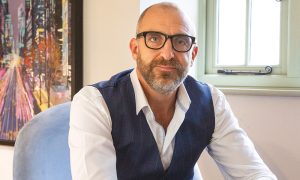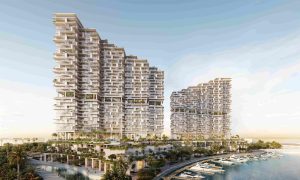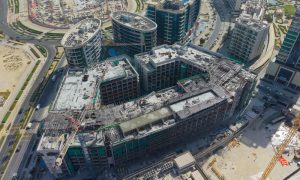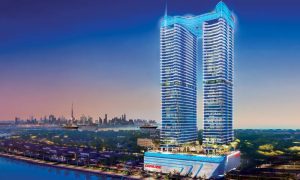Ready for new challenges – Hamish Tyrwhitt interview
Gavin Davids sits down with Hamish Tyrwhitt, CEO of Arabtec Holding, to talk about how the homegrown construction giant is re-energised

Back in May of this year, Arabtec Holding announced its financial figures for the first quarter of 2018, and while they showed a strong performance in the time period (a net profit to parent of $17.2m on revenue of $659.4m), perhaps the most positive aspect was the continued upward progression from 2017.
This trend is important, given the UAE construction giant’s recent past. Just a few years ago, the company was in a state of upheaval, having undergone management changes and restructurings that left it on its knees and struggling to operate efficiently, having reported a net loss attributable to equity holders in the parent of $12.63m in the first quarter of that year. Even this was a marked improvement on the $626m loss posted in 2015.
These figures serve to illustrate the dire circumstances that the contractor was in when Hamish Tyrwhitt took on the role of CEO of Arabtec Holding at the end of November 2016, and the size of the task that was awaiting him, in bringing this homegrown construction giant back to its feet.
Having worked for Leighton Holdings for 27 years across Australia and Asia, Tyrwhitt came on board as Arabtec CEO after being appointed as CEO of Depa Group, an interior solutions provider also part-owned by Arabtec, in April 2018.
Given the situation he faced, he tells Big Project ME that one of the first tasks on his to-do list was to repair the company’s organisation structure, which had been falling apart for quite a long time due to the turmoil in the company. To support the delivery of the company’s key objectives, he made strengthening the management team through a number of senior appointments, a priority task.
These appointments have already had a positive impact on the business, with clearer accountabilities, driven by improved rigour around project and business reporting and reviews, resulting in a strong focus on cash collection, delivery and the closing-out of legacy projects.
“The first thing was really the lack of direction that existed within the company, as far as things like a business plan, a structure and how we were facing the market. Obviously, one of the biggest challenges on day one was the lack of liquidity. We had to understand exactly where we really were at that point and raise additional capital to ensure that the company had a sustainable future,” he says.
“What that meant was that in the first six months of the role, my whole focus was on capital raising, stabilising the existing projects that we had rolling. We also had to rebuild the confidence and trust of the market and put in place a team that would be able to deliver on our commitments.”
In 2017, he and his team set out to deliver Phase One of the strategic roadmap that he had mapped out to stabilise the business. In June that year, they achieved their first major milestone, raising $408.3 million through a rights issue. Not only did this strengthen the group’s working capital and liquidity, but it also allowed Arabtec to extinguish its accumulated losses, thereby accelerating its path towards resuming dividend distributions, he explains.
Having now been in the role for just over a year and a half, Tyrwhitt says the positive financial performance for Q1 2018 was down to the simple strategy that he had put in place, which came with the full backing of Arabtec’s board.
“If you do work that has the ability to make a cashback profit, and if you perform on the project and deliver it on time, with productivity and efficiency, then ultimately you’ll be making a return,” he points out, adding that the first year of the plan was really about stabilising the business, with the focus on capital raising and putting resources into place.
“The second phase was about leveraging the efficiencies and the synergies across the group. It’s about putting the right companies in front of the right clients and doing the right projects in our core competencies. It was about getting that focus right and getting the clients that we wanted to work for, in the sectors that we’re good at. We’re just starting to see the benefits of that project performance,” he asserts.
One benefit has been the reestablishment of Arabtec’s image in the market, with Tyrwhitt explaining that the industry has begun regarding the company and its subsidiaries as viable partners again, a fact evidenced by the hundreds of millions of dollars’ worth of contracts signed over the course of the last year and a half. In fact, the company’s order backlog was $4.41bn for the first quarter of this year, further supported by a solid pipeline of $4.35bn of tenders submitted or under preparation in its primary market of the UAE.
“Putting in place a team of people who are contractors means that when we have conversations with people and concerns or issues are raised, we are able to answer them in a construction manner and take appropriate actions. It’s a small town, and as a construction business, we touch just about everything and we employ people through every cross-section of society. So, very quickly, word gets around that this is a company that’s delivering on its promises, or that this is a company that has other struggles that are distracting it from being able to deliver.
“We’ve got a series of stakeholders that we look at. We’ve got our shareholders, we’ve got our clients, we’ve got our employees and we’ve got our subcontractors and our supply chain. You’ve got to rebuild the trust with every one of those stakeholders, in order to be successful.”
However, this doesn’t mean it has been an easy process for the company. The transformation process Tyrwhitt has overseen has resulted in some tough decisions being made. In November of 2017, he quoted by local media as saying that the construction firm intended to outsource a range of functions that it had been carrying out in-house for many years.
The thinking behind this move was that it would make the company more streamlined and focused. Over the years, a range of internal functions had been developed to allow the company to run smoothly. Whether this was processing visas and arranging travel for staff, or establishing labour accommodation camps and running catering for them, almost everything was done inhouse.
While this may have been necessary years ago, back when the industry was still finding its feet and the supporting industry infrastructure was not there, Tyrwhitt feels that with the market maturing, these services and functions are simply too inefficient for a modern-day construction firm to have in-house.
“We did have quite a few redundancies or restructurings,” he says of the transformation process. “That was really a necessary evolution, because if you look back to when construction companies first set up here, everybody was self-sufficient. You had to build your own labour camps, you had to do your own catering and set up your own transportation business. Everybody had internal subcontractors – you had your own interiors business, you had a piling company, a MEP company and so on, but over time, the industry matures, and it becomes more efficient to outsource.
“There’s a huge amount of outsourcing that we’ve done, but the company hasn’t really evolved over a long period of time. It hasn’t kept innovating and evolving to the changes in the marketplace, and we’re still only halfway through that journey. It’s going to be our main focus, and in fact it’s the main focus of the UAE as well – innovation, productivity, sustainability and efficiency.
“I see it as our duty to understand the direction and the vision that the country’s leaders have, and for us to implement that vision. I think there are many things that the construction industry can do to become more productive and efficient. Part of that is measured in headcount, but there are also many things that we’re doing that have absolutely nothing to do with our core competency, which is construction.”
However, he is keen to stress that this restructuring process is also part of the natural evolution of a construction company, pointing out that the industry itself is quite transient, especially in this region.
“The bulk of employees in the construction sector are expatriates from overseas – that’s throughout the workforce. When people come here, how long do they come here to work? If we say that it’s an average of eight years, then that means that you have a 12% annual turnover rate, just with people departing.
“We have approximately 48,000 people working at Arabtec. For us to have 6,000 people out, it’s only just over 10% of our workforce. So yes, the number is large, but it’s made up of people that are departing, and us not necessarily replacing them, and also putting in place the right processes of outsourcing.”
While part of the reason behind streamlining the company is reducing operational costs and overheads, another factor is the need to be more competitive in a market that has grown increasingly more difficult to operate in for contractors, given the tight margins and increased demands they face.
Given that there has been so much construction that has taken place over a sustained period of time, the market has become quite crowded, which has created a situation where companies no longer feel like they can operate efficiently and profitably.
Given Arabtec’s status as a homegrown tier-one contractor, leaving isn’t an option for the company or for Tyrwhitt, but to thrive, tough decisions need to be made across the board.
Key to this is adopting new methodologies and systems, many of which have become major focus points for the industry. However, he asserts that rather than being reactive to market forces, he’s keen to put in place a culture and ecosystem that embraces these methodologies and makes them part of day-to-day operations.
“I think, for whatever reason, the productivity output of the construction sector in the UAE has been low, if you look at the global benchmark. We are not as productive as we should be. Part of this has been driven by the cost of labour, but as costs have been rising, the market has become more competitive and contractors can no longer be complacent.
“Contractors now have to look at ways of differentiating themselves and evolve and be sustainable. To me, sustainability is about a culture, it shouldn’t just be a department. I remember when the ISO certifications came out in the 1980s, everybody ran around getting ISO-certified for quality and management systems and for safety and setting up safety departments.
“In my view, that’s a responsive reaction to a need. We all have a desire and an aim to ensure that everybody involved in our projects return home as safe as when they came to work. You do that by having a culture where people look after themselves and their colleagues, and by engineering safe solutions and construction methodologies.
“We need to realise that empowerment of people happens when we give people clear responsibilities and accountability, and that’s whether it’s sustainability, safety or efficiency.”
Tyrwhitt says the company has already seen the benefits of implementing such an inclusive culture, starting with its increased market share over the last year. Rather surprisingly, he reveals that despite being a tier-one homegrown contractor, Arabtec only had around 4% market share in the UAE. Last year, that figure increased to 9%, but he insists there is more to come.
“One of our strengths is that we’re always going to be here. We’re homegrown. This is not a satellite office, a branch office or a regional hub. This is Arabtec – and it’s the same with Depa – we run operations from our home in the UAE. We’ve got Depa offices in China, Malaysia, Singapore, Germany, the US and all through the Middle East and North Africa.
“Arabtec has a footprint all through Egypt, Saudi Arabia, Bahrain and Jordan, but if you look at the spread we have for the business – for both companies – the largest share of the business is actually here in the UAE. In the case of Arabtec, it’s over 80%.
“I was very surprised by how low our market share was. Last year, we actually won about 9% of the UAE market share and that put us at the top of the list, but when I look at the breakdown of the market here in the UAE, it is heavily centred around building works. Over time this will shift towards more infrastructure opportunities coming out,” he predicts.
“Infrastructure isn’t just roads and bridges, it’s the assets that invest in societal needs to function efficiently. It’s hospitals, schools, airports, extensions to public transport. This is all infrastructure that joins and glues all of the private development that’s going on.
“The strain that has been put on infrastructure over the last couple of decades here is enormous. You look at the expansion of the airports, you look at Sheikh Zayed Road, when they were first built and what they replaced. People must have thought there was never going to be traffic on SZR, but there’s not a day when there’s no traffic jams. Even the Dubai Metro if you’re on it, or drive past the Metro stations during peak hours, there’s an enormous number of people who are using it, and it isn’t a network that has all the connectivity yet, nor is it capturing all the major population hubs in the city.”
Looking ahead, Tyrwhitt says one of his biggest concerns is payment. He points out that too much of a contractor’s balance sheet is tied up in receivables, and that there is a lack of liquidity in the market, which is crippling it.
“If you’re a property developer, you use your balance sheet to buy a landbank, and you use your balance sheet to fund a project until you sell it. The assets of a construction company should be things like tower cranes, construction equipment and its people. But that’s not the case here. Too much of our balance sheets are tied up in receivables, and we enter into contracts that have payment cycles, but inevitably that’s not what transpires over the life of a job.
“The lack of liquidity is crippling the industry. If tier-one contractors are not paid, then they can’t pay their supply chain, and then their suppliers can’t pay their own supply chains. It becomes like a disease that filters through the sector.
“A construction company needs two things – liquidity and people. We talked about how you need the right people in the right roles, but you also need to have the cash to build, because it’s predominantly a cash-based business and you need to move that money through the cycle of a construction job. We employ so many people, and we have a duty and a responsibility to make sure that those people are paid,” he emphasises.
To that end, Tyrwhitt says more needs to be done to monitor and manage the construction industry in the region. The industry here is relatively easy to enter, and in the past almost anyone could come in, find a local partner and incorporate a company. That has led to a very crowded market, which in turn has created several legacy issues.
While the market is slowly correcting itself, with construction companies that don’t have the balance sheets to withstand the pain associated with a drag on payments dropping out, he maintains that the industry must take it upon itself to resolve these issues.
“It may not necessarily be your fault, but it’s certainly your responsibility. You’re empowered to do that, and the sooner the industry resolves the past and then adjusts to a more sustainable payment profile, the better off we will be.”
Despite all these challenges facing the industry, Tyrwhitt says the future for Arabtec is looking good, as evidenced by the strength of the 2018 order book. The aspect he’s most proud of is that the company hasn’t won any work in the last 18 months that is part of a joint venture, meaning that everything that Arabtec is doing, it is doing by itself.
“We’re utilising the strengths of the group. Whether it’s EFECO that does MEP, or a company like Depa which does interior fit-out. What this means is that we’re in control of our own destiny, and therefore, it’s easier for us to deliver on our commitments. Not having a joint venture partner means that we can respond to drivers that affect us, and not necessarily what might be affecting another company.
“The bulk of that work is in our core market of the UAE, but we’ve also picked up work in Egypt, Saudi Arabia, Bahrain and Jordan, but the UAE is where we’re really focusing, particularly on the blue-chip clients that have also evolved over the last few decades.
“Their project management skills are now much better, as are the consultants that they’re using, and they’ve incorporated the lessons learnt (from the real estate crisis). As such, I think that the overall efficiency, productivity and relationships that exist now, are healthier on the projects that we’ve got,” he asserts, signing off the interview with a strong sense of optimism and hope for the future.























